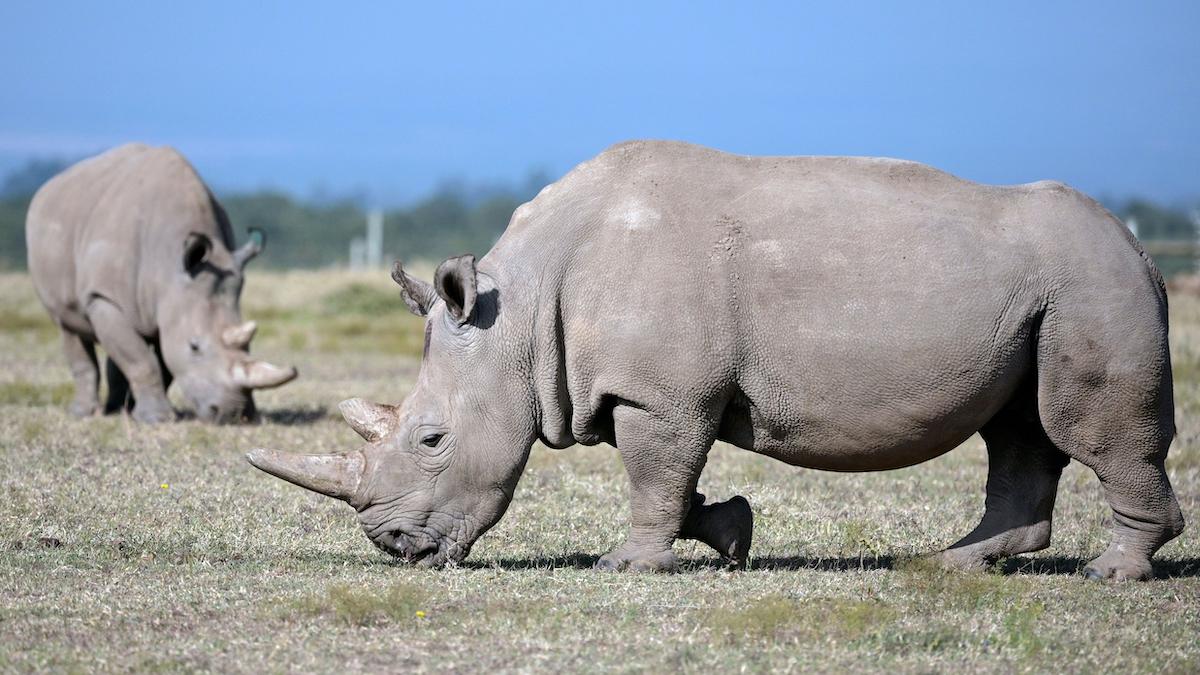
One of the Last Two Surviving Northern White Rhinos Is Being Retired From Breeding Program

Najin (foreground), and her daughter Fatu, the last two northern white rhinos left on the planet, graze in their secured paddock on Aug. 23, 2019 at the Ol Pejeta Conservancy in Kenya. TONY KARUMBA / AFP via Getty Images
The northern white rhino, or Ceratotherium simum cottoni, is the rarest rhino in the world with just two surviving members of the species. Both rhinos, Najin and Fatu, are protected within the Ol Pejeta Conservancy in Kenya. Najin and Fatu are both female rhinos, a mother and daughter duo, and have been part of an assisted breeding program that aims to help the species survive.
But scientists have decided to retire Najin from the program due to ethical concerns.
Najin, 32, is being withdrawn from the BioRescue breeding program for ethical reasonings based on her age and overall health. Ovary cell collections showed that her eggs were no longer viable to become embryos, and scientists have found benign tumors on her reproductive organs.
“It was a difficult decision, very difficult, because we had to evaluate the conservation of the species against the welfare and life of the individual animal involved,” Barbara de Mori, director of the Ethics Laboratory for Veterinary Medicine, Conservation and Animal Welfare for Italy’s University of Padua, told Mongabay. “It was the right decision for Najin.”
Northern white rhinos have been deemed essentially extinct since the last male of the species, Sudan, died in 2018. The breeding program is a final hope to help the species survive. Scientists are still working with Fatu and the frozen sperm cells from now-deceased male rhinos of the species for breeding.
The BioRescue breeding program involves harvesting eggs from the rhinos and implanting embryos in another species of rhino in Kenya. Both Najin and Fatu, along with two male northern white rhinos, were brought to the conservancy for breeding from a zoo in the Czech Republic. The first male, Suni, died in 2014. That year, the scientists also realized that neither of the female rhinos were able to carry a pregnancy to term.
The team behind the assisted breeding program plans to have a northern white rhino calf born in the next 3 years and more members of the species born over the next 20 years.
“We have been very successful with Fatu… So far we have 12 pure northern white rhino embryos,” David Ndeereh, acting deputy director for research at the Wildlife Research and Training Institute in Kenya, told Reuters. “We are very optimistic that the project will succeed.”
This critically endangered species was once found all across Central Africa, but the population is now considered extinct in the wild due to armed conflicts and excessive poaching for their horns. Scientists hope the continued successful creation of embryos will help lead to new northern white rhino calves.
“It is very encouraging to note that the project has continued to make good progress in its ambitious attempts to save an iconic species from extinction,” said Hon. Najib Balala, Kenya’s tourism and wildlife cabinet secretary, in a press release. “With 12 pure northern white rhinoceros’ embryos so far developed, the project should now focus on the next steps of embryos transfer into the surrogate females at Ol Pejeta Conservancy for it to achieve its ultimate objective.”
- World's Last Male Northern White Rhino Dies - EcoWatch
- What We've Lost: The Species Declared Extinct in 2020 - EcoWatch

 233k
233k  41k
41k  Subscribe
Subscribe 